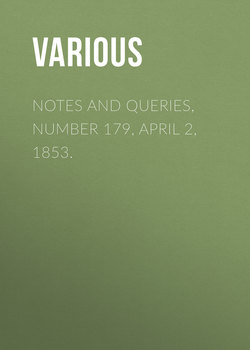Читать книгу Notes and Queries, Number 179, April 2, 1853. - Various - Страница 4
Notes
ST. AUGUSTIN AND BAXTER
ОглавлениеI am not aware that any author has pointed out a remarkable coincidence in the Confessions of St. Augustin and of Baxter:
"Divers sins I was addicted to, and oft committed against my conscience, which, for the warning of others, I will here confess to my shame. I was much addicted to the excessive and gluttonous eating of apples and pears, which, I think, laid the foundation of the imbecility and flatulency of my stomach.... To this end, and to concur with naughty boys that gloried in evil, I have oft gone into other men's orchards and stolen the fruit, when I had enough at home.... These were my sins in my childhood, as to which conscience troubled me for a great while before they were overcome."
Sir W. Scott cites the above passages in his Life of Dryden, with sharp comments on the rigid scruples of the Puritans:
"How is it possible," he says, "to forgive Baxter for the affectation with which he records the enormities of his childhood?… Can any one read this confession without thinking of Tartuffe, who subjected himself to penance for killing a flea with too much anger?…"
It probably did not occur to the biographer, that no less illustrious a saint than Augustin, to whom Puritanism can hardly be imputed, had made a parallel confession of like early depravity many centuries before. Enlarging on his own puerile delinquencies, and indeed on the wickedness of children in general, he confesses that, in company with other "naughty boys" ("nequissimi adolescentuli"), he not only stole apples, but stole them for the mere pleasure of the thing, and when he "had enough at home":
"Id furatus sum quod mihi abundabat, et multo melius. Nec eâ re volebam frui quam furto appetebam; sed ipso furto et peccato. Arbor erat pirus in viciniâ vineæ nostræ pomis onusta, nec formâ nec sapore illecebrosis. Ad hanc excutiendam atque asportandam, nequissimi adolescentuli perreximus nocte intempestâ; et abstulimus inde onera ingentia, non ad nostras epulas, sed vel projicienda porcis, etiamsi aliquid inde comedimus.... Ecce cor meum, Deus meus, ecce cor meum, quod miseratus es in imo abyssi!"—Confessionum, lib. ii. cap. iv.
In comparing the two cases, the balance of juvenile depravity is very much against the great Doctor of Grace. He does not seem to have had even a fondness for fruit to plead in extenuation of his larceny. He robbed orchards by wholesale of apples, which, by his own admission, had no attractions either of form or flavour to tempt him. Yet the two anecdotes are so much alike, that one would be inclined to suspect one story of being a mere recoction of the other if it were possible to doubt the veracity of Richard Baxter.
The incident, however, is one too familiar in schoolboy life to make the repetition of the story a matter of surprise. The property in an apple growing within the reach of a boy's hand has from time immemorial been in peril, and the law itself has not always regarded it as an object of scrupulous protection. The old laws of the Rheingau, and (if I mistake not) of some other states, warranted a wayfaring man in picking apples from any tree, provided he did not exceed the number of three.
E. Smirke.
